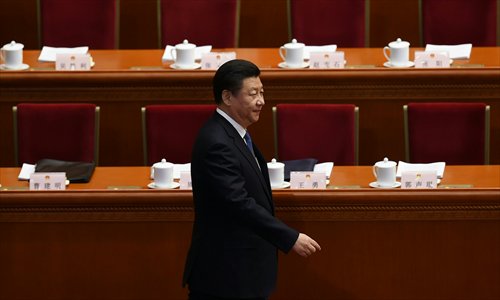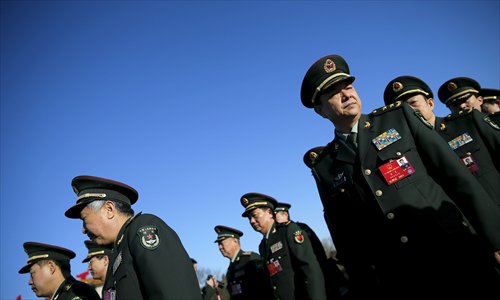Xi urges ‘proactive’ military
PLA needs pre-emptive attitude: president

Chinese President Xi Jinping arrives for the third plenary session of the National People's Congress at the Great Hall of the People in Beijing on Sunday. Photo: AFP
Chinese President Xi Jinping on Sunday urged the country's military to turn cutting-edge military technology into real combat capacity, and urged it to be proactive in combat readiness.
Speaking to the military delegation of the National People's Congress (NPC) during the two sessions, Xi, also chairman of the Central Military Commission (CMC), said the PLA's future hinges on innovation and reform, the Xinhua News Agency reported.
A pre-emptive attitude toward military affairs is needed, said Xi, adding that the military needs to plan and act in advance and establish "unique advantages in some key fields."
Xi also requested the armed forces to uphold political integrity, reform and the rule of law. He urged both central and local authorities to support national defense and military construction, as well as to maintain the military's combat readiness.
"Technology plays a decisive role in whether a country will win or lose a battle," Gong Fangbin, a professor at the PLA's National Defense University told the Global Times.
Only when a nation takes the lead in military technology can it take a leading role on the world stage, Gong said, which is why China's leaders have highlighted theoretical and technological innovation as the key to upgrading the country's military and national defense.
"The realization of the Chinese Dream is based on a strong nation and a strong military, which must rely on powerful and advanced technology," Gong noted, adding that if there is insufficient military capability and innovative technology, China's mission to safeguard domestic and world peace would have no foundation.
Earlier this month, China announced its lowest defense budget increase in six years in the wake of rising economic headwinds. According to a budget report presented to the NPC, military authorities plan to raise the 2016 defense budget by 7.6 percent to 954 billion yuan ($146 billion). Last year's increase was 10.1 percent.

Military delegates arrive at the Great Hall of the People for the third plenary session of the National People's Congress in Beijing on Sunday. Photo: CFP
Active strategy
"China's strategy of active defense does not mean the country would only be defensive. We shouldn't ignore the active strategy in it," Major General Xu Guangyu, a senior consultant of the China Arms Control and Disarmament Association told the Global Times on Sunday.
China's defense strategy needs to follow the trends in world military reform and to improve in accordance with its national strategy of a peaceful rise, Xu said.
Details of China's military reform have been released recently, which includes redrawing the regional military command system and streamlining the leadership of the Communist Party of China. This aims to develop a modern military system "capable of winning information-age warfare," part of the goals for military reform, the CMC announced at a meeting in November 2014.
In February, China announced it would regroup its seven military area commands into five theater commands, a move that observers said is to beef up the PLA's combat capabilities and enhance its response efficiency through a joint command system to face the challenges of a new era.
China on January 12 announced the restructuring of its four military departments into 15 organs under the CMC, a change that analysts say will centralize power under the CMC to improve the efficiency of the military and curb corruption.
The PLA must have uniqueness in weapons, which is an inseparable part of building a strong military, Xu said. The PLA army, navy, air force, Rocket Force and Strategic Support Force must step up innovation to improve the hardware of the army to make sure that China at least does not lag behind the world level, he said.
This strategy means China has the ability to deter other countries from waging a war against China, and to win the war if deterrence fails. These measures are essential as China needs to deliver a message that any wayward provocation will face a strong response from China, Xu noted.
Apart from the launch of the Rocket Force, China also needs other deterrent moves, such as patrols, military drills and necessary defensive facilities, said Xu. Some specific examples of praiseworthy deterrent moves include China's efforts to take an upper hand in the South China Sea, such as establishing the city of Sansha on Yongxing Island and land reclamation measures, he noted.
Read more in Special Coverage: